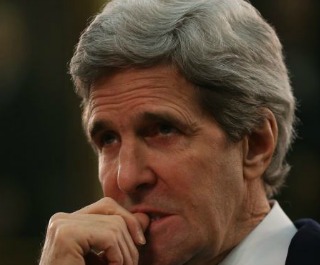 You don’t have to love everything that the U.S. Secretary of State will present in his
'framework’ paper - but there is too much at stake not to support a chance for peace.
You don’t have to love everything that the U.S. Secretary of State will present in his
'framework’ paper - but there is too much at stake not to support a chance for peace.
There’s a kind of hush in the peace camp as Secretary of State John Kerry prepares to issue the “framework” for continued Israeli-Palestinian peace negotiations. And unlike Karen Carpenter's saccharine song, this hush is not intended to make room for the sound of lovers in love. It’s a hush of inhibition, the silence of the skeptics who have known too many past disappointments.
And that’s a shame. Not because there is no reason for skepticism. There are lots of reasons. But because there are also reasons for hope. And these reasons deserve to be enhanced by support from the peace camp.
Think about it: When was the last time that a determined U.S. president and a dogged secretary of state prepared a U.S. paper to be put on the table to pressure both Israeli and Palestinian leaders to negotiate seriously? When was the last time that an American president and his top diplomat framed their brokering efforts not as an act of benevolence toward Israelis and Palestinians who yearn for peace, but as a key U.S. national security interest, effectively telling the leaders of both peoples: “You owe it to us as much as you owe it to your publics.”
Hope stems also from the positive role that the international community is playing, expressing support for both parties, promising benefits if a peace deal is achieved, but underscoring the liabilities of the continued status quo. And from the Arab League, which continues to re-affirm its peace initiative, offering Israel full normalization with the entire Arab world if Israel reaches a peace deal with the Palestinians.
As risk averse as both Prime Minister Netanyahu and President Abbas may be, they are leaders who can deliver. Both of them. If Netanyahu decides to go for a peace deal (and yes, it is a very big “if”), most Israelis would follow. The same goes for Abbas. He will face internal opposition, but polls and pundits indicate that if he offers a viable deal that promises Palestinians independence and hope for a better future, they will support it. Both leaders are already pressured by important players in the Israeli and Palestinian elites to take bold steps for peace. These include prominent businesspeople and security officials. And both leaders have made some positive statement in recent days.
In the coming days, Secretary Kerry is expected to submit his “framework” document to Netanyahu and Abbas. It will not be a perfect document. Many in the peace camp will pounce on what they will consider imperfections. Many, who have previously perfected the art of making the perfect the enemy of the good, will do that again. Unwittingly they will play into the hands of the anti-peace opposition, into the hands of those who are experts at making the status quo the enemy of vital change. That would be a terrible mistake.
So, as the song goes, listen very carefully. Kerry’s “framework” is not an endgame, but merely an on-ramp, a tool to re-energize the languid negotiating process. It is supposed to boost negotiations, not to stifle them.
The peace camp has a role to play – modest as it may be – in determining whether the negotiations take off after the “framework” is put on the table. You don’t have to love everything in the U.S. document. But if you support the two-state solution you must do what you can to support this effort, which the Obama administration has justifiably been depicting as possibly a last ditch attempt.
It may be a good thing that the expectation level from this process is low and that there is no premature exuberance. The Israeli opposition seems pretty drowsy as well. But the moment will soon come in which Obama and Kerry could use all the public support they can have. That’s our moment. There is too much at stake for us to not support a chance for peace.
Yes, it’s a long shot. We may very well face another disappointment. But this effort could also – at last – be the one that ends the process and culminates in peace.
As the song goes, it isn’t a dream.
This article appeared first in Haaretz on March 24, 2014.